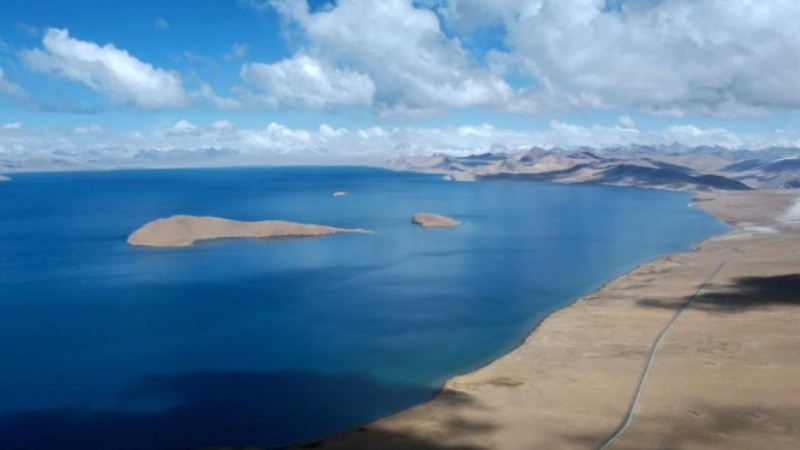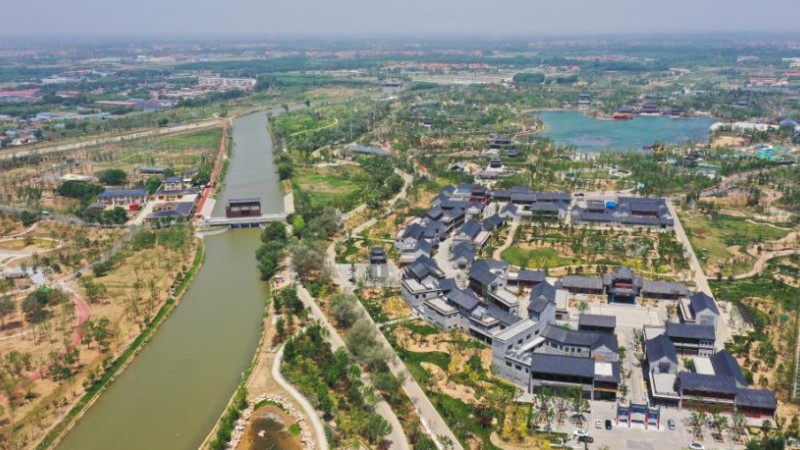More action against plastic pollution needed, says WWF section lead

A child views a display of ocean plastic pollution at H22 City Expo in Helsingborg, Sweden, on June 17, 2022.(Xinhua/Fu Yiming)
According to the UN Environment Programme, more than 400 million tonnes of plastic is produced annually, half of which is designed to be used only once. Of that, less than 10 percent is recycled. An estimated 19-23 million tonnes end up in lakes, rivers, and seas.
GENEVA, May 28 (Xinhua) -- More action against plastic pollution is needed, Eirik Lindebjerg, Global Plastics Policy Lead of the World Wide Fund for Nature (WWF) told Xinhua in a recent interview.
"The overproduction and consumption of plastic are suffocating our rivers and oceans, killing wildlife, contaminating our food, air, and water, and it's only getting worse," Lindebjerg said, stressing the urgency ahead of World Environment Day 2023 and the United Nations (UN) plastic pollution treaty talks in Paris.
"The World Environment Day this year is about plastic pollution and finding solutions to stop and reduce plastic pollution, which is one of the fastest growing and accelerating global environmental crises," he said.

A man takes photos of the art installation "Turn Off The Plastic Tap" outside the Ripley's Aquarium of Canada in Toronto, Canada, on June 7, 2022. (Photo by Zou Zheng/Xinhua)
According to the UN Environment Programme, more than 400 million tonnes of plastic is produced annually, half of which is designed to be used only once. Of that, less than 10 percent is recycled. An estimated 19-23 million tonnes end up in lakes, rivers, and seas.
The UN plastic pollution treaty talks, aimed to develop an international legally binding instrument on plastic pollution, is to be held in Paris between May 29 and June 2.
"This is the final meeting before we go into discussing the legal text. Therefore, it's important that governments come to this meeting with great ambition and ready to define concrete global rules and regulations that are needed," he said.
The treaty's negotiations are expected to be concluded by 2024, he said, adding that negotiators must now flesh out the details of the treaty text to most effectively and equitably tackle plastic pollution.
"WWF is calling for a treaty that can ban or quickly phase out the most high-risk plastics, products, chemicals, additives from being produced," Lindebjerg said, stressing the importance of reuse and non-toxic recycling at a large scale.

A man arranges bottles at a market in Blantyre, Malawi, on April 16, 2021. (Photo by Joseph Mizere/Xinhua)
It's also important that the treaty has a proper support mechanism for implementation, such as financial support and technical collaboration, he added.
Hailing China's contribution in this area, Lindebjerg said actions such as the promotion of the "Beautiful China Initiative" and the strengthening of biodiversity conservation as a national strategy are "important steps."
Photos
Related Stories
- Plastics "pervasive" in food supply: Australian study
- Beijing's key pollution reading down 20 pct in Jan-Aug
- Beijing to ban non-degradable plastic packaging from delivery outlets
- Beijing's key pollution reading down 33 percent in Jan-Feb
- China's war against pollution extraordinarily successful: University of Chicago researcher
Copyright © 2023 People's Daily Online. All Rights Reserved.









